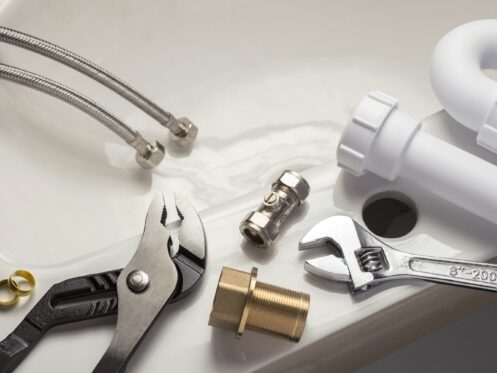Annual plumbing inspections are essential for maintaining the smooth operation and longevity of a home’s plumbing system. Experienced plumbers often encounter various issues during these inspections, highlighting the importance of regular maintenance. From leaky pipes and faulty fixtures to clogged drains and outdated equipment, these inspections reveal potential problems that, if left unaddressed, can lead to significant water damage, increased utility bills, and even health hazards. By proactively identifying and resolving these issues, homeowners can ensure the optimal functionality and safety of their plumbing systems, ultimately saving them from costly repairs down the line.
1. Hidden Leaks
Among the most common issues plumbers encounter during annual inspections are hidden leaks. The leaks can occur in pipes concealed behind walls, under floors, or in the ceiling. Detecting them requires specialized equipment, such as thermal imaging cameras or moisture meters. This helps with identifying temperature variations or water accumulation. Identifying and repairing hidden leaks promptly prevents water damage, mold growth, and potential structural issues.
2. Deteriorating Pipes
Over time, pipes can deteriorate due to age, corrosion, or shifting soil. Plumbers inspect a plumbing system, looking for signs of rust, discoloration, or visible damage to the pipes. Deteriorating pipes can lead to leaks, reduced water pressure, and even pipe bursts. Identifying and replacing compromised pipes ensures the longevity and efficiency of your plumbing system.
3. Clogged Drains
Another common issue plumbers encounter is clogged drains. These clogs can occur in a kitchen sink, bathroom drain, or shower. They are often caused by debris, grease, hair, and other substances accumulating over time, causing blockages. During inspections, plumbers use drain cameras to identify the location and nature of the clog. They then employ various methods like snaking or hydro-jetting to clear the blockage and restore proper drainage.
4. Faulty Water Heaters
Plumbers also pay close attention to water heaters during annual inspections. They examine the unit for signs of leaks, corrosion, or sediment buildup. Additionally, they test the pressure relief valve, check the thermostat settings, and ensure the proper functioning of the heating elements or gas burners. Addressing any issues with your water heater ensures efficient and safe operation while preventing unexpected cold showers or potential water damage.
5. Faulty Faucets and Fixtures
Plumbers inspect faucets, showerheads, and other fixtures for signs of wear and tear. They check for leaks, loose connections, and mineral deposits that can affect the performance and water efficiency of these fixtures. Replacing worn-out parts or repairing faulty components helps maintain optimal water flow and prevents unnecessary water waste.
6. Running Toilets
A running toilet can be a major source of water waste and an annoyance to homeowners. Plumbers check the internal components of toilets, such as the flapper valve, fill valve, and overflow tube, to identify and fix the cause of the continuous running. Fixing this issue saves water and helps homeowners avoid unnecessarily high water bills.
7. Sewer Line Problems
Plumbing inspections also involve assessing the condition of sewer lines. Plumbers inspect for tree root intrusion, pipe deterioration, blockages, or misalignments that can cause sewer backups, foul odors, or health hazards. Early detection and remediation of these issues are crucial to preventing extensive damage to the sewer system and contamination.
8. Water Pressure Issues
Low or fluctuating water pressure can indicate underlying problems within a plumbing system. Plumbers use pressure gauges to measure the water pressure and inspect the system for issues such as clogged pipes, faulty pressure regulators, or mineral buildup. Correcting water pressure problems ensures efficient water flow throughout your home and improves the performance of appliances.
9. Faulty Sump Pumps
Plumbers inspect and test sump pumps, especially when there is a risk of flooding. These devices help prevent water damage by pumping out excess water from the sump pit. Plumbers check for proper pump operation and potential electrical issues. The goal is to ensure the discharge pipes are clear and functioning correctly to protect the property from water intrusion.
10. Inadequate Insulation
Lastly, plumbers inspect the insulation around exposed pipes, especially in cold climates. Inadequate insulation can lead to frozen pipes, which can burst and cause extensive water damage. By identifying insulation issues and providing appropriate solutions, plumbers help homeowners prevent costly repairs and potential water loss.
Contact Professionals Today
Are you facing stubborn clogs, leaky faucets, or malfunctioning toilets in Sarasota, FL, or its surrounding areas? Look no further than Next Level Plumbing for all your plumbing needs. Our team of skilled professionals specializes in drain cleaning, faucet repairs, toilet installations, and much more. Our expertise and state-of-the-art equipment guarantee efficient and reliable services to keep your plumbing system running smoothly. We also offer water and sewer line services to address any larger-scale issues you may be experiencing. Contact Next Level Plumbing today to schedule a consultation.


